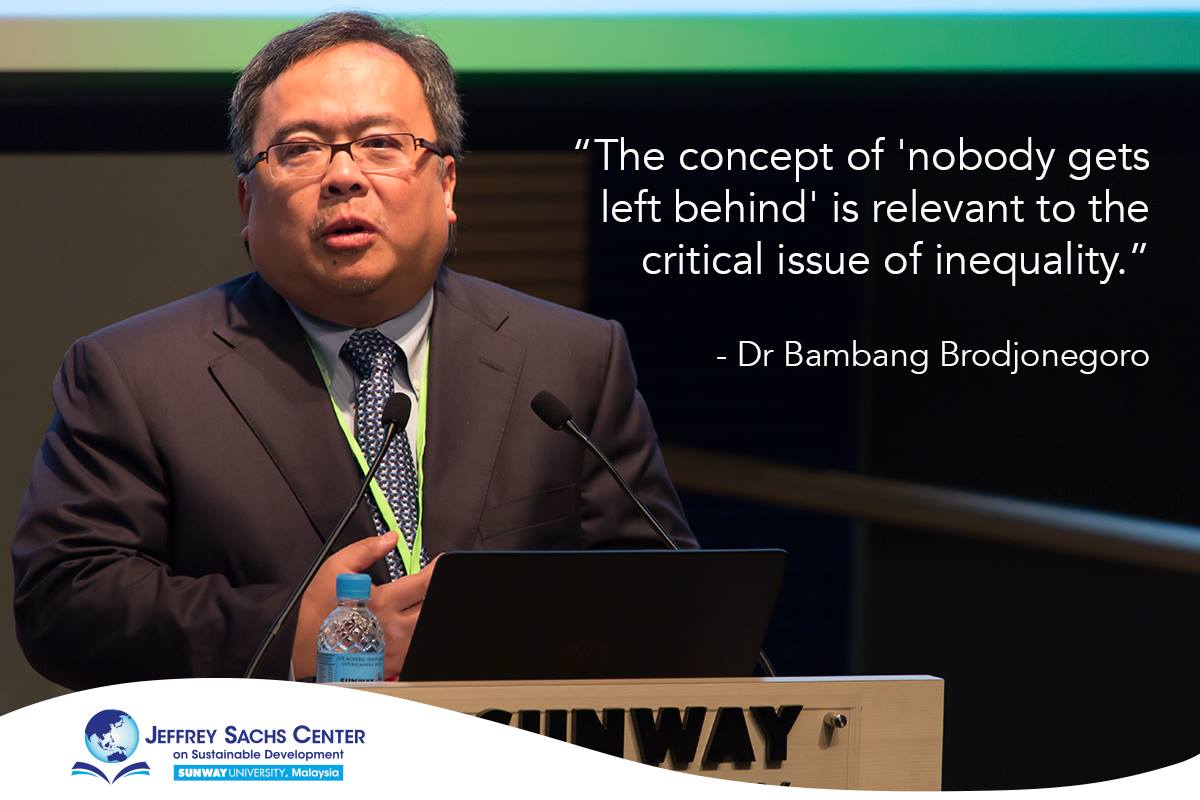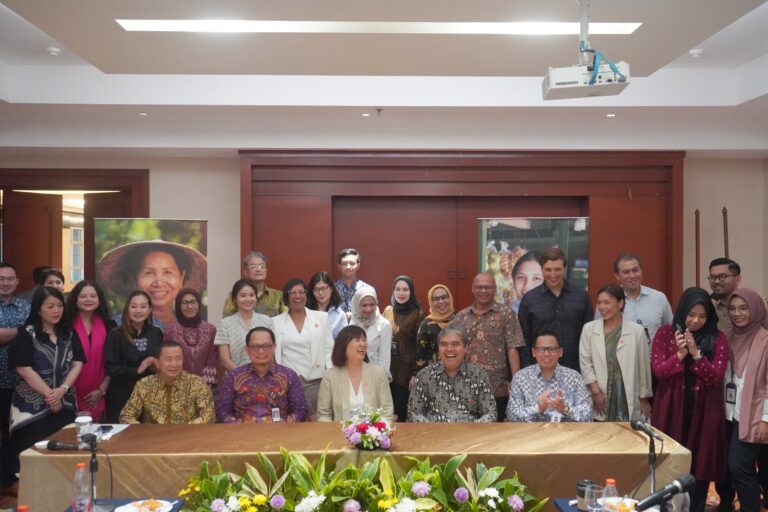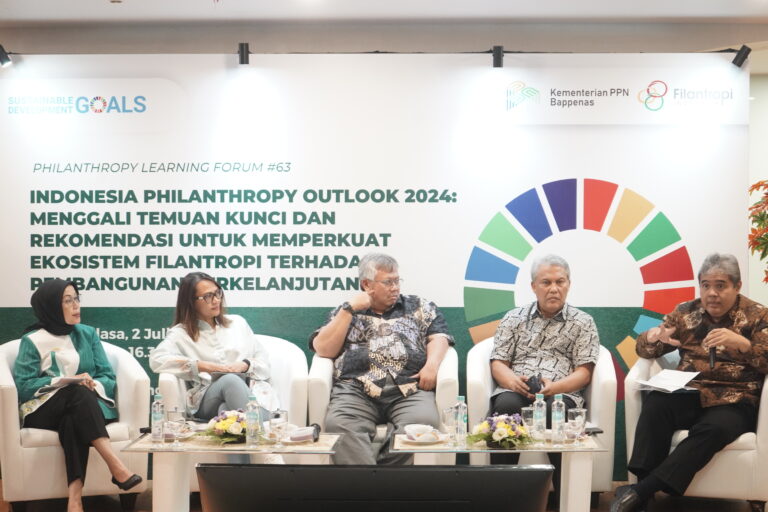Minister of National Development Planning/Head of BAPPENAS, Bambang P.S. Brodjonegoro shared about Indonesia\’s experiences in implementing the SDGs during the ASEAN Ministers Workshop 2017 took place in Kuala Lumpur, Malaysia on April 25, 2017.
Kuala Lumpur. On April 25th, 2017, The Minister of National Development Planning/ Head of National Development Planning Agency, Mr. Bambang P.S. Brodjonegoro gave his speech at The ASEAN Ministers Workshop 2017 in Kuala Lumpur Malaysia. The theme of the workshop was on“Navigating the Headwinds of Sustainable Development in ASEAN”. The workshop was organized by Jeffrey Cheah Foundation that co-organized with Jeffrey Sachs Center on Sustainable Development and Jeffrey Cheah Institute on Southeast Asia, both at Sunway University in Kuala Lumpur, Pulau Banding Foundation and LESTARI University Kebangsaan Malaysia.
The first session of workshop was attended by Prof. Jeffrey D. Sachs as the Special Advisor to UN Secretary General Antonio Guterres on the Sustainable Development Goals and the head of the UN Sustainable Development Solution Network, Prof. Mari Pangestu former Minister of Tourism and Creative Economy and Professor of Economy and Business at University of Indonesia, and ministers from other ASEAN countries like from Malaysia, Cambodia, Lao PDR.
Mr. Bambang presented his speech on “Implementing SDGs in Indonesia”. His speech was an important and strategic sharing knowledge experience and learning among ASEAN countries on how SDGs are adopted as national development agenda. He firstly presented the achievements and lessons learned of MDGs to give the audience a background that Indonesia’s SDGs implementation is the continuation of MDGs and taken into consideration the lessons learned from the MDGs’ experiences. He followed his presentation with the experience on how Indonesia implement the 2030 Agenda, followed by the process and progress of Indonesia’s Voluntary National Review (VNR) 2017. He included his presentation with the issues and challenges in the implementation of SDGs before giving his conclusion remark.
Achievements and Lessons Learned from MDGs
Pak Bambang stressed out that Indonesia has successfully achieved 49 out of the 67 indicators of the MDGs by the end of 2015. Among others are to achieve the target to eradicate extreme poverty, universal primary education, promote gender equality and empower women, reduce child mortality rate, combat Tuberculosis (TB) and malaria diseases, ensure environmental sustainability especially access to improve water and sanitation in urban areas, as well as utilization of mobile phone.
However, there are some targets that are still considered as unachieved that include: Poverty reduction with national standards (US $ 1.25 per capita per day), reducing maternal mortality rates, decreasing HIV and AIDS prevalence, decreasing the prevalence of children under the age of five with malnutrition, increasing the proportion of households with sustainable access to water and basic sanitation in rural areas. The unfinished agenda faced challenges on implementing MDGs targets which are on the reduction of disparity among provinces and districts/municipalities as well as among socio-economic condition, limited resources from non-state actors, development of database of the MDGs indicators at the district and city levels, more top-down approach from the government and insufficient communication strategy and advocacy to stakeholders at national and sub-national levels.
Indonesia’s Strong Commitment on SDGs
The experiences and lessons learned from MDGs at the global level had been brought on the development of the 2030 Agenda on Sustainable Development that was declared in September 2015. Indonesia has taken some important steps for implementing SDGs. Indonesia’s commitment to implement the 2030 agenda is realized by mainstreaming SDGs into National Medium Term Development Plan for 2015-2019. Since Indonesia has already involved for the discussion of Post-2015 Agenda, therefore Indonesia could align 94 out of the 169 global targets that contained in the 17 goals of the SDGs in the development plan. Pak Bambang also mentioned that as a reflection of the highest commitment and leadership of the President of Republic of Indonesia, Indonesia also has prepared a Presidential Decree to implement SDGs that has reached the final stage of enactment. In addition, at present Indonesia is also preparing the development of Indonesian SDGs Roadmap by the year 2030, National and Sub-national Action Plans for five years, the establishment of the institutional arrangement to better coordinate the implementation of SDGs, the development of SDGs communication strategies, as well as the development of integrated SDGs database.
Pak Bambang shared that Indonesia follows the universal development principles, integration and no-one left behind principles in implementing SDGs. To manage the implementation as well as to monitor SDGs, Indonesia has clustered the 17 goals, 169 targets and 241 indicators of SDGs into four (4) pillars. Implementation and grouping of the 17 goals is referred as localizing SDGs in Indonesia. The four pillars refer to the three dimensions of Sustainable Development which are social, economic and environmental development, plus one pillar that covers Goal 16 on justice and governance, with reasoning to enhance the peace, justice and strong institutions. The classification of the four (4) pillars was intended to ease the management of the 17 goals but the implementation stage they are interlinked.
To adopt the SDGs\’ inclusive principle, a Four participation platforms of SDGs is established. These platforms consist of Government and Parliament, Academia and Expert, Philanthropy and Business, and Civil Society Organizations and the Media. Each platform has specific but interconnected roles. This multi-stakeholder partnership is fully incorporated in the National Coordination Team based on the instruction on Presidential Decree on SDGs. The implementation team and the four technical working groups members consist of relevant government representative as well as representative from the non-state actors namely from philanthropy and business, CSOs and media, and academia. In order to fulfil the representation of non-state actors’ platform, Bappenas as the coordinator had consulted with each platform to obtain the appropriate representative from them.
In addition to legal and institutional arrangement that have been prepared, Indonesia has also identified indicators that are relevant with Indonesia’s context to measure SDGs achievement as reflected in the Indonesian SDGs Metadata. The Indonesian SDGs Metadata was developed by implementing the inclusive and no-one left behind principles which involves all representation of the four participation platforms.
In relation to the preparation of Voluntary National Review (VNR), in the High Level Political Forum on SDGs that will be held in this coming July. Indonesia is among 44 countries that will present the progress of SDGs implementation in 2017. Indonesia applies the global guideline to conduct the review and consistently applies the inclusive principle during the review process to ensure the ownership and broader active public participation by implementing the online-offline public consultations. The other most important review is the interconnectedness between the seven SDGs reported goals with the focus theme of this year’s review is on “Eradicating Poverty and Promoting Prosperity in a Changing World”. The outcome attainment is directly influenced by the access to quality basic social services, sustainable livelihood, and sustainable environment.
Pak Bambang also shared some challenges that have been faced and identified for implementing SDGs in Indonesia. One of the biggest challenges is ensuring inclusive and no-one left behind principles being implemented, integrating all stakeholders’ program into SDGs action plans, and synergizing between government priorities and non-state actors. Another challenge is building a comprehensive and inclusive database.
For his closing remark, Pak Bambang delivered his messages that the ASEAN communities could bring valuable knowledge and insights from the forum to continue the good work and partnerships to ensure the achievement of SDGs. Indonesia is open for ASEAN countries to learn from Indonesia’s experiences, also open to receive insights and lessons learned from other ASEAN countries. ASEAN countries should be at the forefront on SDGs implementation at the global level, especially in Asia Pacific Region. SDGs implementation in ASEAN would facilitate in achieving common desire and collective will, to live in a region of lasting peace, security and stability, sustained economic growth, shared prosperity and social progress.



